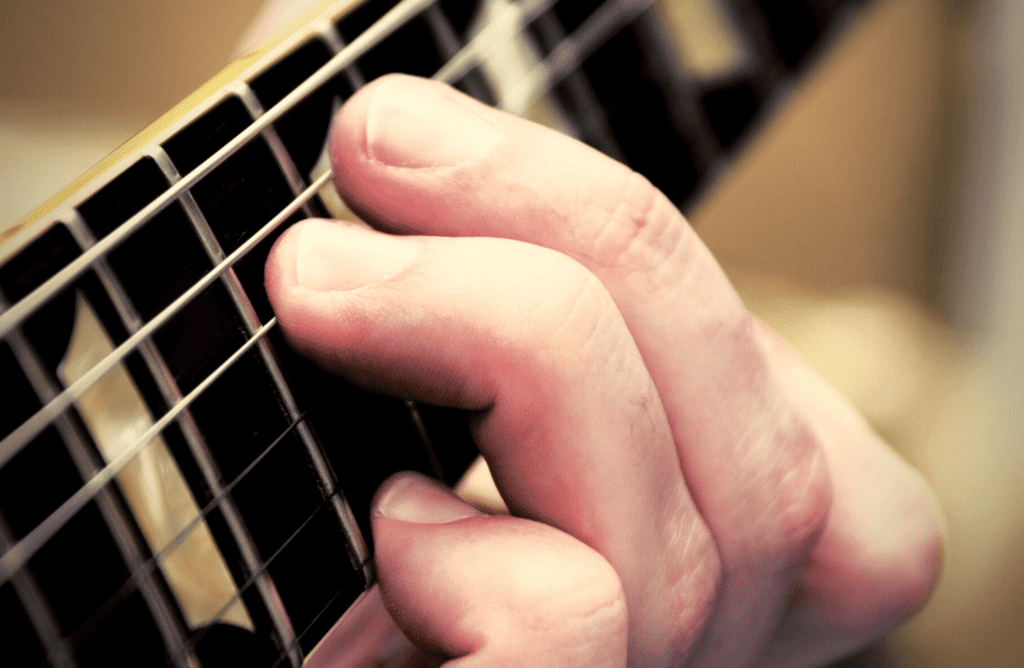Have you ever wondered how certain players get that wonderful tone in their playing? You’ve been practicing for months and seem to get that tone just right. There are a couple of basic concepts you need to apply every time you pick up your guitar to achieve this tonal prowess. In this lesson, I’ll go over what you need to know, and how to improve your guitar tone using your playing technique alone.
Previously, I covered a few cheap ways to improve acoustic guitar tone and electric guitar tone. Any of these methods could help you achieve a better sound from your guitar. But they’re not a replacement for a good technique.
90% of your tone comes from the fingers. I can’t tell you how many times a student told me that they bought a new pedal, amp, guitar, pickups, or even strings to sound like their guitar hero only to be let down when their tone falls short of their goal. What many players don’t quite understand is that the tone they want takes time to develop. Sure, the gear you use will have some effect on your overall sound. However, it’s your “touch” on the strings that define your tone. I will break your tone down into 4 steps: Pick articulation, finger placement, dynamics, and vibrato.
Table of Contents
1. Pick Articulation
The most important thing to remember is that you never want to strike the strings too hard. The strings vibrate on an elliptic pattern and when struck too hard, they slap back against the frets. You can imagine the sound of metal hitting metal. Not a particularly pleasing effect for most of your playing.
You also want to give thought to the angle of the pick. You can hold the pick level with the string and achieve a very percussive sound. The pick can also be angled down, which will give you more tone from the string and less attack. You can further experiment with bending your thumb to push the pick downward. This helps to slice through the string and create less friction.
Lastly, try holding the pick with the teardrop end facing the base of your thumb. This means the contact surface of the pick will be the rounder edge. I’ve been playing this way for many, many years now and prefer it over the traditional suggestive picking surface of the tear drop end.
2. Finger Placement
If your finger is not as close to the fret, that is the fret toward your picking hand, your tone will be full of buzz. You may not hear this buzz immediately after playing the note, but when you transition to a new note the buzz will be apparent.

Your fingers NEED to be close to the frets at all times. Is there an exception to this rule? Only when placing your fingers on multiple strings in the same fret when playing double stops or chords. Bottom line – whenever you can play against the fret, do so.
3. Dynamics
Your tone will suffer if you only play at one dynamic level. It’s helpful to think of your speech pattern as you play. You talk louder when you’re excited or trying to drive some a point, softer when you’re relaxed, you might take your time between words to help someone better understand an idea.
To be effective with your tone, you can’t play at one volume level. Mix it up a bit as you do with your natural speech patterns and you’ll sound much better.
4. Vibrato
When you hold on to a note whether it be in the beginning, middle, or end of a phrase – you don’t want the note to just “sit” there. Think of a vocalist or horn player. They warm up their sound and add “motion” to their notes by adding vibrato.
This is just a shaking of the string to vary the pitch slightly. Usually pulling the string downward and allowing it to return to its resting position again. Keep the string riding along the fret as you do this or you’ll lose the note and probably create that awful buzzing again.
Be careful not to bend the string. You don’t want a new note produced, just a slight variation of the note you are playing.
A slight variation of this is to pivot on your fingertip along the length of the string. This is a more subtle approach that originated with classical guitarists because it’s impossible to bend nylon strings. When performing this “horizontal” vibrato, be sure to keep your finger within the frets. If you pass over the frets in either direction you’ll obviously change the pitch.
Go here if you want to learn more about improving your vibrato.
Conclusion
Well, that’s how to improve your guitar tone using nothing but your fingers. It’s not a The journey of refining your tone starts here and will continue for years. Your touch on the strings will evolve and develop as you gain more awareness of the fingerboard and your technique. Enjoy the journey.
If you enjoyed this article, check out our other free guitar lessons, we have a whole bunch of them.
The impact the fingers have on tone is 100% underappreciated! Thanks for sharing this!
It’s easy to go out and buy a new amp, just to discover that it didn’t solve the problem. The real work is to develop this “touch”. I totally agree with that post.